Introduction: Why the Syringe Tip Matters

In the vast world of medical consumables, the syringe is a fundamental tool. However, for procurement managers, distributors, and healthcare providers, a critical decision lies in a small but vital feature: the tip. The connection between a syringe and a needle (or other device) is standardized by the “Luer” taper system, which comes in two primary forms: Luer Lock and Luer Slip.
Choosing the correct type is not just a matter of preference; it directly impacts patient safety, clinical efficiency, and the risk of hazardous exposure. This guide will break down the differences to help you make an informed sourcing decision for your organization.
What is a Luer Slip Syringe?
A Luer Slip syringe features a simple, tapered tip. The needle hub is “slipped” onto this tip and held in place by friction. There is no twisting or locking mechanism.
- How it Works: The operator pushes the needle hub directly onto the syringe barrel’s tip. The tapered design creates a secure, leak-resistant seal if applied correctly.
- Common Applications:
- Simple injections (e.g., intramuscular or subcutaneous).
- Vaccination clinics where speed is essential.
- Aspirating fluids.
- Any procedure where a quick needle change is beneficial and high pressure is not involved.
- Pros for Procurement:
- Speed: Very fast to attach and detach needles.
- Cost: Often slightly more cost-effective in bulk.
- Cons to Consider:
- Security Risk: The connection is only held by friction. There is a risk of the needle accidentally detaching if not secured properly, or if high pressure is applied. This can lead to spillage, waste, or needlestick injuries.

What is a Luer Lock Syringe?
A Luer Lock syringe features the same basic taper, but it is surrounded by a threaded plastic collar. The needle hub has corresponding “lugs” or threads that allow it to be twisted and securely locked onto the syringe.
- How it Works: The operator pushes the needle hub onto the tip and then twists it clockwise to “lock” it into place. This creates a secure, leak-proof, and mechanically stable connection.
- Common Applications:
- High-Pressure Injections: Essential when injecting viscous (thick) medications.
- IV Therapy: Used for connecting to IV lines, catheters, and infusion pumps.
- Critical Care (ICU): Standard for central lines and arterial lines.
- Handling Hazardous Drugs: Used in oncology for chemotherapy drugs, where spillage is extremely dangerous.
- Continuous Infusions: Prevents disconnection during long-term medication delivery.
- Pros for Procurement:
- Maximum Security: The lock virtually eliminates the risk of accidental needle detachment and spillage.
- Patient Safety: Crucial for maintaining the integrity of an IV line or during critical procedures.
- Regulatory Compliance: Often the required standard for specific high-risk procedures.
- Cons to Consider:
- Time: Takes a fraction of a second longer to attach/detach (due to the twisting motion).
Head-to-Head Comparison: Luer Lock vs. Luer Slip
For a busy procurement manager, here is the at-a-glance comparison:
| Feature | Luer Slip | Luer Lock |
|---|---|---|
| Connection Method | Friction-fit (push-on) | Threaded (twist-on) |
| Security Level | Moderate | High (Secure) |
| Risk of Detachment | Higher (under pressure or by accident) | Extremely Low |
| Best Applications | Simple injections, vaccinations | IVs, high-pressure, hazardous drugs |
| Ease of Use | Fastest connection | Fast, but requires an extra twist |
| Primary Advantage | Speed and simplicity | Safety and security |
Export to Sheets
The Procurement Decision: Which Should You Stock?
The right choice depends entirely on the intended clinical application. Most healthcare facilities stock both types to cover all needs.
Stock Luer Slip Syringes for:
- General wards
- Vaccination and immunization programs
- Dermatology and allergy clinics
- Situations where cost and speed are the primary drivers.
Stock Luer Lock Syringes for:
- Intensive Care Units (ICUs) and Operating Rooms (ORs)
- Oncology departments
- Radiology (for contrast media)
- Any department using infusion pumps
- Any procedure involving central lines or high-viscosity medication.
Ultimately, prioritizing patient safety often leads to a wider adoption of Luer Lock syringes, as they provide a “failsafe” against accidental disconnection, protecting both the patient and the clinician.
Source Your Certified Syringes from a Trusted Partner
Understanding the nuances between Luer Lock and Luer Slip is key to effective medical sourcing. Ensuring your supply is high-quality, sterile, and certified (CE, FDA, ISO) is the next critical step.
At Ary Medical, we specialize in providing a full range of B2B medical consumables, including all types of Luer Lock and Luer Slip syringes, IV sets, and medical needles. We support healthcare distributors, hospitals, and GPOs with flexible OEM/ODM services and reliable bulk supply.
Need to secure your supply chain? Contact us today for a bulk quote on our certified medical syringes and consumables.

